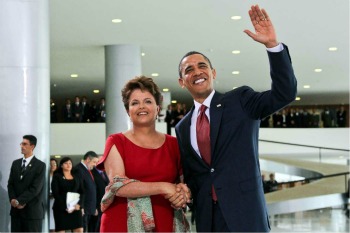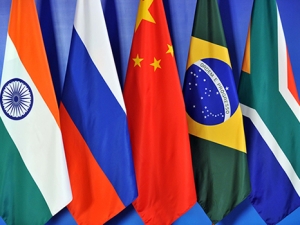Starpower Trumps Diplomacy
Along with fellow BRICS nations China, India, Russia, and South Africa Brazil is regarded as one the world’s five most powerful emerging economies. A recent poll says it is the most admired of this group. It is also a leading candidate for a new permanent seat on the UN Security Council (along with Germany, Japan, and India). And it has been selected as the site of both the 2014 World Cup and the 2016 Olympic Games. No, Brazil does not have the planet’s greatest publicist. Its incredible rise in the past dozen years is due to many factors. Self-promotion is not among the most important.
Some of Brazil’s luster comes from gifts of nature. It is the world’s fifth largest country by area, and the sixth largest by population. Recently discovered oil deposits will soon make it a major petroleum exporter. Few nations match its sheer physical beauty, the richness of its natural environment, or the diversity of its people. Brazil can also boast of the exceptional talents of some of its citizens—their prowess at soccer, for instance, which has made the Brazilian team jersey the most popular worldwide, and the creativity and universal appeal of their music. None of this needs to be propagated by diplomats or public relation firms.
Admiration for Brazil reflects impressive national accomplishments as well. Brazil’s democracy is firmly rooted, and its economy, now the planet’s sixth largest, has been stable and expanding. It was hardly scathed by the global financial crisis. To be sure, Brazil remains a relatively poor country of pervasive poverty and social injustice, race discrimination, and political corruption, but it has made visible progress on most of these problems in recent years. Among developing nations, it is an acknowledged leader in anti-poverty programs. Its battle against HIV/AIDS has been among the globe’s most effective. It has launched an ambitious affirmative action agenda for its black citizens. No, Brazil has not succeeded on all fronts. Criminal violence and drug abuse plague the country. Despite recent advances, its massive Amazon rain forests and other natural resources remain poorly protected. Health provision, education, transportation and many other government services are, for the most part, woefully inadequate. Still, it would be a mistake not to acknowledge Brazil’s remarkable progress in recent years.
Exceptional presidential leadership since 1995 has been a central factor in Brazil’s new found stature. Luiz Inacio Lula da Silva and Fernando Henrique Cardoso, both of whom served two terms, are two of Latin America’s most highly regarded leaders ever. Brazil’s international status is intimately linked to their stewardship. It is early to judge current president Dilma Rousseff, but she is more popular than either of her predecessors were at this point in their presidency.
Brazil has one atypical advantage for large, powerful countries: it has no enemies. Brazil maintains friendly relations with an extraordinarily wide political and ideological spectrum of nations. Its army is a small, defensive force which is mostly used for UN peacekeeping and occasionally battling urban drug gangs. Brazil has fully renounced nuclear weapons. No enemies, a tiny army, no nukes. A propagandist couldn’t make this up.
Brazil’s efforts to win friends have a downside, however. To avoid offense, the Brazilian government has, with few exceptions, refrained from taking strong positions on critical international issues. Although a non-nuclear power, it has not been a consistent advocate for non-proliferation. While its commitment to democratic values at home is unquestioned, Brazil has rarely stood up for democracy, the rule of law, or human rights in other countries. And that is what has most irritated the U.S.
Arguably, Brazil’s most problematic relationship worldwide is with the United States. The two countries are not adversaries; they maintain friendly relations and cooperate in many areas. But, for the past decade at least, Brazil has frequently opposed the U.S. And when it has said no to Washington in the past, its standing with most of the world usually rose. Even when bedrock U.S. interests, like Iran’s nuclear program, were at stake, Brazil has emphasized and sometime trumpeted its differences with Washington.
President Dilma with President Obama during her recent visit to the U.S.
© Flickr, 2012.
The United States, in turn, often seems to treat Brazil as an interloper in world affairs which does not measure up to the status it has achieved. Brazil wants just the opposite from the U.S.—acknowledgement of its rightful place among the world’s most important nations. Changes in approach could advance the interests of both nations. Although the U.S. and Brazil are initiating a number of educational and scientific exchanges, neither appears ready to do much to fundamentally alter their relationship—which is likely to remain mostly amiable and cordial, though with limited cooperation, much discord, and some disagreeable clashes. An investment in public relations won’t change that.
Brazil has rarely resorted to public diplomacy to advance its interests or pursue its goals. It hasn’t really had to. And, in any event, what could a publicist do any more than what Brazilian teams and soccer stars playing across the globe weren’t already doing? What could public diplomacy accomplish that Lula’s natural warmth and personality didn’t already achieve? When President Barack Obama visited Brazil last year, he insisted on visiting a Brazilian favela and speaking to a wide public audience. When Dilma Rousseff traveled to Washington this past April, her only public appearance was at the Chamber of Commerce talking to business leaders. Maybe Brazil will turn to public relations when its starpower begins to sputter. Now it just turns on the charm. But maybe that’s just what public diplomacy is all about.
Tags
Issue Contents
Most Read CPD Blogs
-
January 29
-
January 20
-
January 28
-
January 2
-
January 8
Visit CPD's Online Library
Explore CPD's vast online database featuring the latest books, articles, speeches and information on international organizations dedicated to public diplomacy.










Add comment